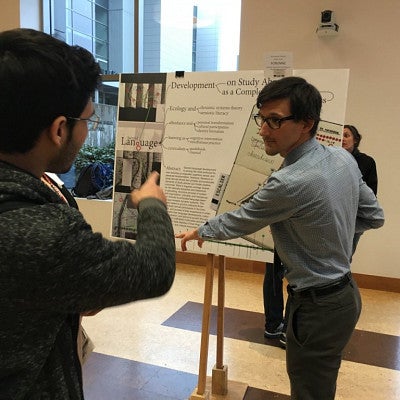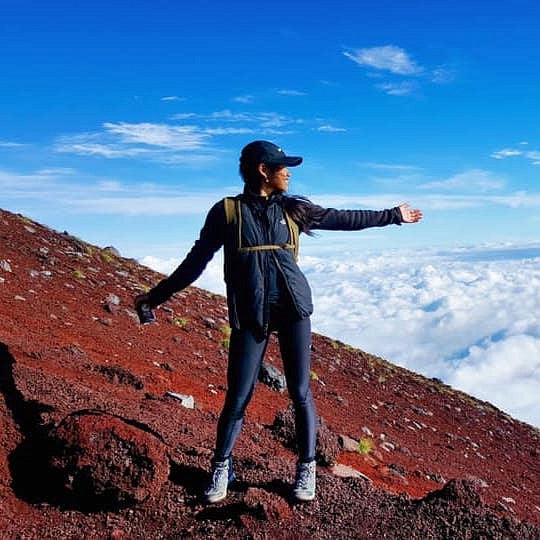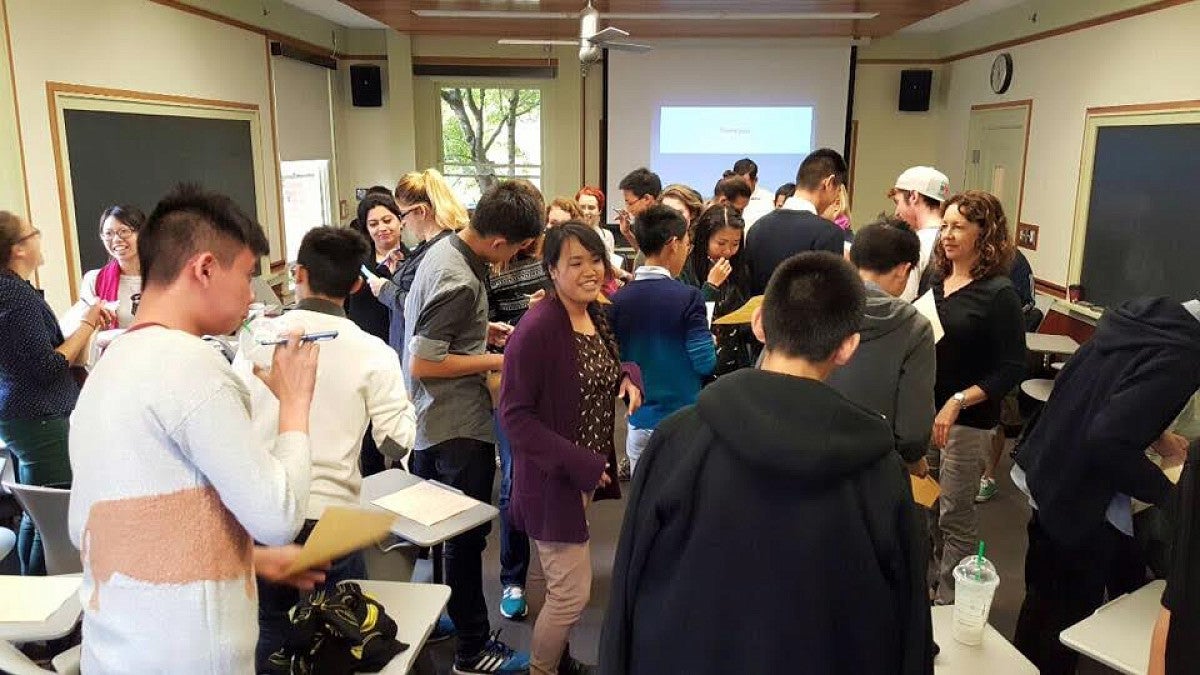
Language Teaching Studies
The University of Oregon Master of Arts (MA) degree program in Language Teaching Studies is an 11-month intensive graduate degree designed to prepare leaders in the field of language teaching and learning. A unique feature of this program is that participants are able to specialize in more than one language, including majority languages such as English and minoritized languages such as the indigenous languages of the Pacific Northwest.
The MA in Language Teaching Studies focuses on transformational approaches to language instruction through innovation in curriculum, pedagogy, materials development, digital technologies, and assessment, including how evidence-based principles and practices can be adapted across a wide range of language learning contexts. The program is particularly sensitive to the evolving needs of both majority and minority language learners in this era of globalization and internationalization.
Priority application: February 1st. Rolling admissions after February 1st.
Apply to the MA in Language Teaching Studies
Although not required, some academic background in linguistics or experience in language teaching is recommended as preparation for our program. Ready to apply? Start your application now!

"Through the LTS capstone project, I was able to combine my interest in cognitive psychology and language. This research continues to influence my teaching today and has become the subject of my current professional work at Tokyo International University. Furthermore, as a graduate employee at the American English Institute and the hands-on teaching practice course, I could implement what I was learning in the program directly into the classroom. Thanks to the program's flexibility and innovative courses, I was able to learn alongside international students and about various indigenous languages which enriched my experience tremendously. I am deeply grateful for the networking opportunities and the experiences that the LTS program has provided me."
-Alexis Busso, MA in Language Teaching Studies, 2018

Program Overview
The MA Language Teaching Studies (LTS) is designed to support all language teachers. Program goals include:
- Identifying the common practices of successful language learners as well as the diverse characteristics of languages and learner needs.
- Emphasizing methodologies and curricula that align with current research and theory.
- Recognizing the importance of social context, identity, and agency in language use.
- Highlighting best uses of digital tools to motivate and inspire learners in and beyond the classroom contexts.
- Providing a background in language evaluation to match a new international need for proficiency-based assessment.
- Applying what has been learned in the program to an individualized capstone project (See a list of projects since 2005).
- Welcoming program participants into a cohort model based community, strong social networks, and professional development opportunities.
Many of our students specialize in teaching English, or in English and an additional language, but some students focus specifically on a language other than English (e.g. Spanish, Ichishkiin, Korean, Mandarin, French, Japanese, among others). Some students focus on the revitalization of endangered languages, such as those of the Sahaptin family, or on less commonly taught languages, such as Thai, Persian or Arabic. Most applicants to the program already have the expected proficiency in the target language(s) typically required for teaching positions in the language(s), although teacher-learners of very endangered languages may also be building their own language proficiency. This rich linguistic diversity is possible through collaboration with other departments and organizations at the University of Oregon, such as the East Asian Languages & Literatures Departments (EALL), the Romance Languages Department, the Yamada Language Center, and the Northwest Indigenous Language Institute (NILI), among others.
Who Enrolls in Our Program
A linguistics background is very helpful but not required for applicants to our program. An MA in Language Teaching is considered the terminal degree for language teachers who wish to teach adults or children in private or public schools, institutions, colleges, or universities in the US or abroad. Our graduates teach across multiple contexts both in the US and abroad. See our Career and Professional Development page and the LTS blog to see examples of what some of our graduates have done or are doing now.
Public K-12 schools require additional licensure in their local states, as well as preparation through programs such as the UO Teach Program in the College of Education. Public elementary and secondary schools abroad likewise generally require additional local certification.
Cohorts have been approximately 12-15 students in recent years, ensuring a quality graduate experience.
Applicants to our program include international students as well as US citizens, and pre-service as well as experienced teachers seeking additional qualifications.
Course of Study
Length of Program
The Language Teaching Studies program is designed as an intensive MA degree that can be completed in four consecutive quarter terms beginning in Fall term (late September) and continuing through early August in the subsequent Summer term (11 months). Students may choose to stay longer than four terms in the program, for example for 2 years on a less-intensive schedule, or part time. A longer schedule allows for more personalization through additional electives within Linguistics or across departments, and/or fewer courses per term. Applicants should consult with Director Keli Yerian when planning an extended or alternate schedule.
Master's Degree Requirements
- 40 credits in Linguistics and Language Teaching coursework
- 5 master's project course credits and the successful completion of a final master's project
- Each course grade must be a B- or higher in order to satisfy degree requirements. Please be aware of the University of Oregon policy that requires all graduate students to maintain a 3.0 GPA in order to graduate.
Course Load
13-15 credits per academic year trimester (5 in final Summer term) for 45 credits total.
Required Courses
Linguistics and Language Teaching Courses
Class Number | Class Title | Credits |
|---|---|---|
LING 530 | Research Methods in Applied Linguistics | 4 credits |
LT 534 | Language Learning in Context | 4 credits |
LT 536 | Design for Learning Language Systems | 4 credits |
LT 537 | Second Language Teaching Practice* | 4 credits |
LT 538 | Design for Learning Language Pragmatics | 4 credits |
LT 539 | Design for Learning Language Pronunciation | 4 credits |
LING 544 | Second Language Acquisition | 4 credits |
LT 630 | Curriculum and Materials Development | 5 credits |
LT 631 | Measuring Language Ability (Includes 1 credit of Digitally Mediated Language Learning) | 5 credits |
LING 605 | Design for Language Learning | 2 credits |
LT 604 | Internship | 2 credits |
LT 611 | Masters Project | 5 credits |
*Students with more than two years of full-time teaching experience have the option of replacing this course with elective credits.
Electives
Students working towards an MA degree can take additional optional elective course work, which may include any language or education related coursework, internships, or supervised tutoring or teaching opportunities. Students who have already taken any of the required courses of their equivalents previous to entering the LTS program should replace them with elective credits in consultation with the LTS Director.
Courses that can count as electives include:
- Additional LT courses or seminars
- Graduate level courses in other language departments (such as Romance Languages or East Asian Languages and Literatures)
- Courses in the School of Education, International Studies, Psychology, and others
Internships are arranged on an individual basis in a range of language teaching or curriculum developing contexts. Students can intern in language classrooms at Lane Community College, in various Foreign Language classes at the UO or LCC, and in K-12 classrooms in the Eugene area, for example in the Chinese Immersion School. Classroom internships involve observation, assisting, and some teaching under the supervision of a cooperating teacher. LTS students can also earn internship credit through tutoring UO FL and ESL students individually, such as through the UO Writing Lab, if the tutoring is part of a supervised program.
Language Requirement
All graduate students are required to either a) have taken at least two years of one additional language within the past seven years either before or by the time they graduate with the MA, or b) pass a proficiency test at an intermediate level or above in an additional language (administered at the UO). At the MA level, any additional language is acceptable, including English as an additional language for relevant international students.
Master's Project
All LTS students complete a final Master's Capstone Portfolio Project in the final summer term. Projects are individual portfolios of materials designed during the program. It is presented in a public forum during the final term. See our blog for more information on the Master's Project, including past projects.
Typical Course Schedule
+Electives as needed, depending on student schedule
Course Descriptions, Linguistics (LING) and Language Teaching (LT)
Linguistics (LING)
LING 544 Second Language Acquisition (4)
Introduction to how languages are learned. Special attention to learning issues that classroom teachers need to address.
(elective) LING 594 English Grammar (4)
Survey of grammatical, syntactic, and morphological structures of English in terms of semantic and functional criteria.
(there are many other Linguistics courses that can be taken as electives as well)
Language Teaching (LT)
(elective) LT 528 Culture, Language, and Literature (4)
Interaction between language and culture as it relates to second language teaching. Application to teaching of literature.
LT 536 Design for Learning Language Systems (4)
Application of language teaching principles and theory to the design of materials and plans for teaching and learning language systems, including discourse, grammar, and lexis.
LT 537 Second Language Teaching Practice (4)
Intensive workshop and practice in language instruction. Team-teaching of weekly English as a spoken language course including designing activities and creating materials. Sequence with LT 435/535, 436/536. Pre- or coreq: LT 436/536.
LT 539 Design for Learning Language Pronunciation (4)
Introduction to the principles of pronunciation teaching and their application to specific language in lesson plan development and practice teaching.
LING 530 Research Methods for Applied Linguistics (4).
LT 630 Curriculum and Materials Development (5)
Includes 1 credit of Digitally-Mediated Language Learning. Introduction to the elements of curriculum design and related materials development, especially as related to language course and program design. Practical application. Prereq: LT 436/536.
LT 631 Measuring Language Ability (5)
Includes 1 credit of Digitally-Mediated Language Learning. Principles and types of language assessment; focus on classroom assessment. Assessment design and integration into curriculum. Test planning with consideration of classroom and situational variables. Prereq: LT 630.
LING 605 Reading and Conference: [Topic] (1-9) (typically 2 credits)
Individual reading and bibliographic work supervised by a faculty member. Prereq: Instructor’s consent.
Workshop: Digitally-Mediated Language Learning
This workshop focuses on the integration of digital technology resources in language teaching and learning. It is integrated in Winter and Spring terms with LT 630 and LT 631. Prereq: Program majors.
LT 604 Internship: (typically 2 credits)
Internships are arranged individually in language classrooms or other language education institutions.
LT 611 Masters Project (5 credits)
Required to complete an MA in Language Teaching Studies. Projects are individual. Prereq: Program Majors and Instructor’s consent.

